Best reads in Research for Health
Welcome to this reader in research for health, equity and development. I trust that you will find something useful, interesting, inspiring, and even entertaining.
Given all the other development priorities facing emerging countries and populations, why would they or development agencies want to invest their research, science & technology, and innovation systems and capacities? Why not rely on what the outside world does or funds? Will this investment impact on improved health for their own citizens, on a more fair distribution of health and wealth? Are such investments key to socio-economic growth? Is this the best way of spending the scarce national resources available for development? What ‘research capacity’ do we actually need? What role for the for-profit sector?
These are all great questions. At COHRED, we certainly believe that investing in a nation’s research and innovation capacity is an essential cornerstone of sustainably achieving health, equity and development, nationally and globally. And we are not alone. Many others believe this too and provide good evidence to prove the point – from many different angles.
Some of the publications are scientific articles, others are books, blogs, opinion pieces, newspaper reports, or even videos. All are credible – but not all are ‘scientific evidence’ – and some contradict each other on important points. This is a personal list of preferred readings in this field which I would like to share. Please send me any other material you feel will deserves to be listed here. Learn and enjoy, and I look forward to hearing from you!
Click here if you want to send me other interesting reading materials. Thanks!
Carel IJsselmuiden
Executive Director COHRED
Should you want to reference a publication you found first here, please acknowledge this website so that others can find it as well !
1. Africa’s neglected area of human resources for health research – the way forward.
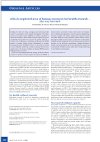 Carel IJsselmuiden, Debbie Marais, Francisco Becerra-Posada, Hassen Ghannem. Africa’s neglected area of human resources for health research – the way forward. South African Medical Journal, 2012; 102: 228-233.
Carel IJsselmuiden, Debbie Marais, Francisco Becerra-Posada, Hassen Ghannem. Africa’s neglected area of human resources for health research – the way forward. South African Medical Journal, 2012; 102: 228-233.
There is scarce literature on ‘Human Resources for Health Research’. In this study, we try to give a first overview of potentials and challenges in Africa. Without the people to do the research, no research for health, equity and development is going to happen.
2. Poor Economics. A Radical Rethinking of the Way to Fight Global Poverty
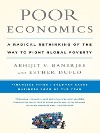 Abhijit Vinayak Banerjee, Esther Duflo. Poor Economics. A Radical Rethinking of the Way to Fight Global Poverty. PublicAffairs, April 2011. ISBN: 1586487981
Abhijit Vinayak Banerjee, Esther Duflo. Poor Economics. A Radical Rethinking of the Way to Fight Global Poverty. PublicAffairs, April 2011. ISBN: 1586487981
Banerjee and Duflo take you on a tour of how solid evidence and ‘randomized controlled trials’ help to dispel myths and find new ways of practically improving poverty, education, health. The book has key lessons for anyone – including researchers for health – on how to improve our work. It is very readable and provides great case studies, examples and links to web-sites.
3. Building capacity in health research in the developing world.
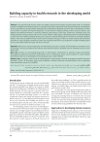 Mary Ann Lansang, Rodolfo Dennis. Building capacity in health research in the developing . WHO Bulletin 2004; 82: 764-770.
Mary Ann Lansang, Rodolfo Dennis. Building capacity in health research in the developing . WHO Bulletin 2004; 82: 764-770.
In this article, Lansang and Dennis define ‘research capacity’ as much more than simply ‘training’ individuals. They make it clear that there are many levels of ‘research capacity’. Even well trained persons need supportive institutions, financing, national demand and international collaborations, for example. COHRED has been building on this framework.
4. Responsible Vertical Programming: how global health research can deliver essential research, achieve impact and build national systems.
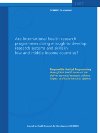 Andrew Kennedy, Carel IJsselmuiden. COHRED Statement 2007. Responsible Vertical Programming: how global health research can deliver essential research, achieve impact and build national systems. Geneva, COHRED, 2007. ISBN92-9226-024-3.
Andrew Kennedy, Carel IJsselmuiden. COHRED Statement 2007. Responsible Vertical Programming: how global health research can deliver essential research, achieve impact and build national systems. Geneva, COHRED, 2007. ISBN92-9226-024-3.
Many low income countries depend on external sources for their research budgets. Unintentionally, the many uncoordinated research projects can fragment national research agendas, monopolize scarce research capacity by focusing research on a few funded conditions, disempower national decision-makers and make it very difficult for low and middle income countries to build their own sustainable research institutions and systems. “Responsible Vertical Programming” aims to create awareness of this problem and proposes a way forward in which achievement of primary research goals can be productively matched with strengthening national research systems.
5. How to change the world. Social entrepreneurs and the power of new ideas.
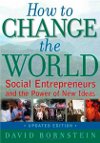 David Bornstein. How to change the world. Social entrepreneurs and the power of new ideas. New York, Oxford University Press, 2004. ISBN 0-19-513805-8.
David Bornstein. How to change the world. Social entrepreneurs and the power of new ideas. New York, Oxford University Press, 2004. ISBN 0-19-513805-8.
By now a ‘recent classic’, Bornstein gives many examples of how inspired individuals made significant contribution – in ways ‘beyond aid’ – through ‘social entrepreneurship’. It also has good examples of how ‘research for health’ improves health and saves lives. Well worth reading.
6. Mountains beyond mountains.
 Tracy Kidder. Mountains beyond mountains. The quest of Dr Paul Farmer, a man who would cure the world. Random House, 2004. ISBN 0-8129-7301-1.
Tracy Kidder. Mountains beyond mountains. The quest of Dr Paul Farmer, a man who would cure the world. Random House, 2004. ISBN 0-8129-7301-1.
Besides the inspiration from the work done by Paul Farmer and colleagues in Haiti, the book also provides examples of why countries can not rely only on global health research, and may prevent great problems if they had good national research systems – including the multi-drug resistant tuberculosis epidemic in Peru. The book is a ‘must read’ for anyone in development!
7. Health Research – essential link to equity in development
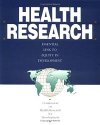 Commission on Health Research for Development. Health Research – essential link to equity in development. Oxford, Oxford University Press, 1990. ISBN-0-19-520838-2.
Commission on Health Research for Development. Health Research – essential link to equity in development. Oxford, Oxford University Press, 1990. ISBN-0-19-520838-2.
This is the report that got COHRED going in 1993. It provided the evidence for the gross mal-distribution of research resources in the world – now known as the ‘10/90 gap’. The report gives insights into the need to spend on health research in low and middle income countries, set targets, and provides examples. It pre-dates the increases in global health research funding through private and ‘public-private’ research funding in developing countries and it takes a narrow view, focusing on health research rather than at ‘research for health’. It should be basic reading for anyone working in this field.
